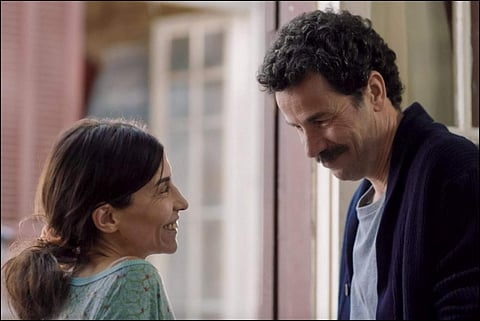

Palestinian actor Saleh Bakri’s face is like a changing canvas. Expressions flit across it to compose profound portraits of human strife and turmoil. In Maryam Touzani’s The Blue Caftan, Morocco’s official entry for International Feature Film Oscar, the camera stays viscerally close to him in confiding the many enigmas of desire and commitment, repression and liberation to the audience.
As a clothier, stitching and embroidering custom-made caftans for clients, when machines are taking over, Safdi’s character Halim is an outlier. The handsome, middle-aged man is at odds when it comes to the game of love as well. There’s fierce devotion to his wife Mina (Lubna Azabal), the one who pulled him out of the abyss of lovelessness that he had been stuck in since childhood, yet an inability to reciprocate her passion, to respond to her caresses. Stealthy encounters at the male hammam (bath) briefly help release the feelings he has long held captive. A young apprentice Youssef (Ayoub Missioui) stokes the yearning further.
As the camera glides from Missioui’s flirtatious eyes to Safdi’s surrendering glances with the assertive jealousy of Azabal in the backdrop, Touzani directs the human interplay like a limpid waltz aided by the supple skills of her performers, till intimations of mortality, throw the three together in a real dance of companionship and solidarity that is both wrenching and affirming in equal measure.
Touzani’s filmmaking eschews explanations for the power of the implicit. Like the exquisite piece of clothing getting wrought within the film, from which it also derives its title, she fashions a delicate tapestry of human nature, relationships, and situations. In the act of letting go lies the embrace of a new possibility, the final farewell leading on to fresh beginnings.
It took me a whole year to catch up with The Blue Caftan. I skipped it at the Cannes Film Festival where it premiered in the Un Certain Regard section, also winning the Fipresci critics award. I couldn’t find time for it again at the Toronto International Film Festival. Perhaps for a reason. Watching it uncensored at the Red Sea International Film Festival in Jeddah, Saudi Arabia, where same-sex relationships are illegal and the queer community faces severe repression, it was hard not to be cognisant of the irony in the public’s (majority of them women) engagement with the film, a mix of coyness, discomfort yet captivation. There were no walk-outs.
At that moment, the film also seemed to have become, unwittingly at that, a larger metaphor for a reality wherein the social, religious and institutional barriers can be defied to uphold the dignity of an individual. The blue caftan, both the clothing and the piece of cinema, are crafted like an elegant act of welcome resistance. “Don’t be afraid to love,” says Mina in the film. So says Touzami as well. And the audience is all ears.